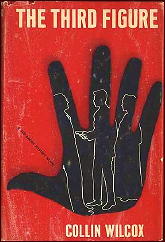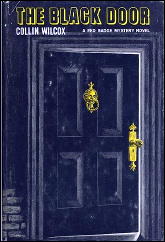Thu 27 Aug 2009
A TAD Review by Allen J. Hubin: COLLIN WILCOX – The Third Figure.
Posted by Steve under Reviews[4] Comments
COLLIN WILCOX – The Third Figure. Dodd Mead, hc, 1968. Hardcover reprint: Detective Book Club, 3-in-1 edition, August 1968.

Clairvoyance, says the dictionary, is the ability attributed to some of being able to see the unseeable. I suspect a good many of the investigators who have practiced down through the history of detective fiction might justly have been accused of solving by clairvoyance rather than deduction.
Collin Wilcox now provides us with Stephen Drake, whose investigational success is expressly attributed to occasional attacks of clairvoyance.
Drake, a newspaper reporter appearing in his second book, is approached by the estranged wife of a murdered gangster (local head of “The Outfit”) with the offer of $10,000 for the solution of the crime. Drake, whose characterization must be the ultimate reaction against hardboiled detectives (he may be the first of the unboiled detectives — which is consistent with the author’s intent to create a “gentle hero”) accepts the job against his own better judgment.
His subsequent involvements with various echelons of “The Outfit” give him ample cause to regret that decision. His investigation consists of a good deal of aimless muddling about, hoping to set the stage for clairvoyance — mostly he gets paroxysms of fear — and eventually he arrives at the same solution I’d reached some 75 pages earlier.
Collin Wilcox exhibits some rough talent which future books will hopefully polish, and Stephen Drake is interesting enough to make this volume worth reading. Drake’s clairvoyance is treated well: as an inexplicable and fallible, but occasionally useful, source of insight, not as a wondrous and magical tool.
However, I found the book difficult to get involved in, the Drake characterization a little too gentle to identify with, and the plot somewhat underweight. Although Drake’s success is allegedly based on clairvoyance, his approach is more crude deduction than anything else. I suspect I would find the story of a truly clairvoyant solution to a crime intensely frustrating reading.
One further suggestion: with Collin Wilcox, Colin Wilson and Colin Watson active in the mystery field, won’t someone adopt a pseudonym?

[UPDATE] 08-27-09. Al mentioned a previous appearance for Stephen Drake; that was The Black Door (Dodd Mead, 1967), but perhaps finding plausible cases for a clairvoyant detective to solve proved too great a challenge, as there was never a third.
When I was looking through the first volume of TAD this evening, I spotted this review right away. Even though it was written over 40 years ago, my immediate thought was that it ties in perfectly with the series of comments following the previous post, the discussion (pro and con) having to do with combining psychic phenomena with detective fiction.
By the way, while Collin Wilcox did write two novels under the pen name Carter Wick, most of his mysteries were written under his own name; his most commonly used series character was Sgt. (later Lt.) Frank Hastings, of the San Francisco Police Department.
August 27th, 2009 at 10:00 pm
Wilcox did much better with Hastings, at least one of which teamed him with Bill Pronzini’s Nameless.
And don’t forget Colin Dexter.
August 28th, 2009 at 9:22 am
There was only one team-up between Hastings and “Nameless,” a book called TWOSPOT that came out in 1978.
And while I was looking that up, I saw that Wilcox had a third series character, a PI (and ex-actor) named Alan Bernhardt, whom I’d forgotten all about. Bernhardt was in five books toward the end of Wilcox’s life — he died in 1996 — and one of them was also a team-up with Hastings: EXCEPT FOR THE BONES (1991).
As for Colin Dexter, at least his last name didn’t start with “W.” But Al couldn’t have mentioned him in his review anyway. Dexter’s first book didn’t come along until 1975, seven years later…
August 31st, 2009 at 1:29 pm
Steve will probably be the only one to notice this, but Wilcox also did two tie-ins (or straight novelizations) of the McCloud TV series. They are pretty good actually.
August 31st, 2009 at 1:46 pm
Right you are, Juri. From the Revised Crime Fiction IV, by Allen J. Hubin:
McCLOUD:
* Collin Wilcox: (books)
o McCloud (n.) Award 1974
o The New Mexico Connection (n.) Award 1974
* David Wilson: (books)
o The Corpse Maker (n.) Award 1974
o The Killing (n.) Award 1974
o A Dangerous Place to Die (n.) Award 1975
o Park Avenue Executioner (n.) Award 1975
I don’t know who David Wilson is. He may be a house name only, or the pseudonym of someone else, but these four McCloud books are the only ones under his name in CFIV.
By the way, Al calls them all “novelizations,” a statement that I ought to look into sometime, to see if they were actually based on episodes of the TV series, and if so, which ones. (I may already done this sometime in the past. I reinvent wheels a lot, too.)